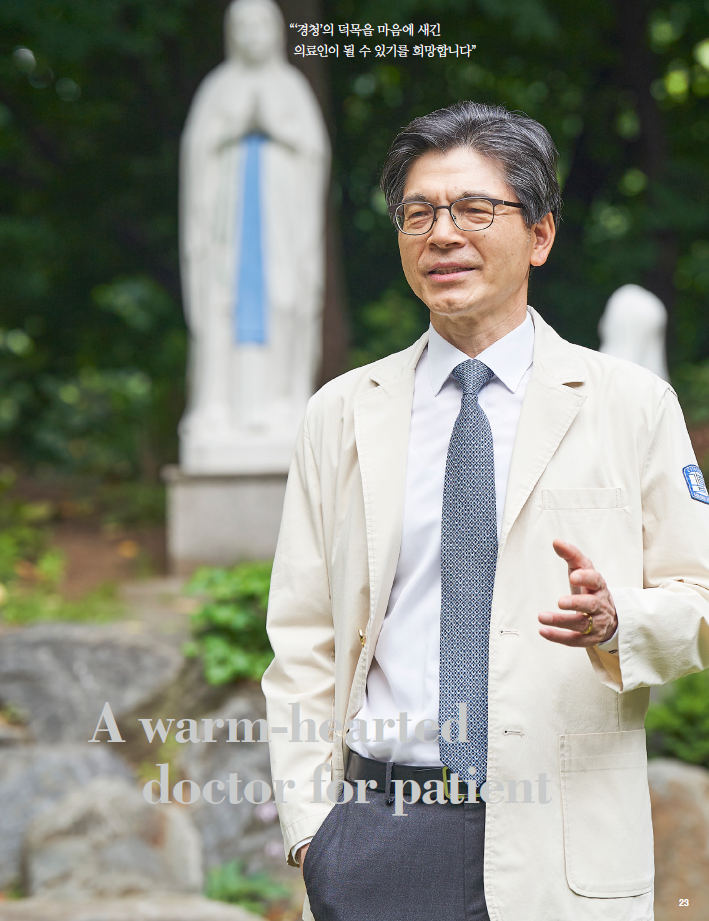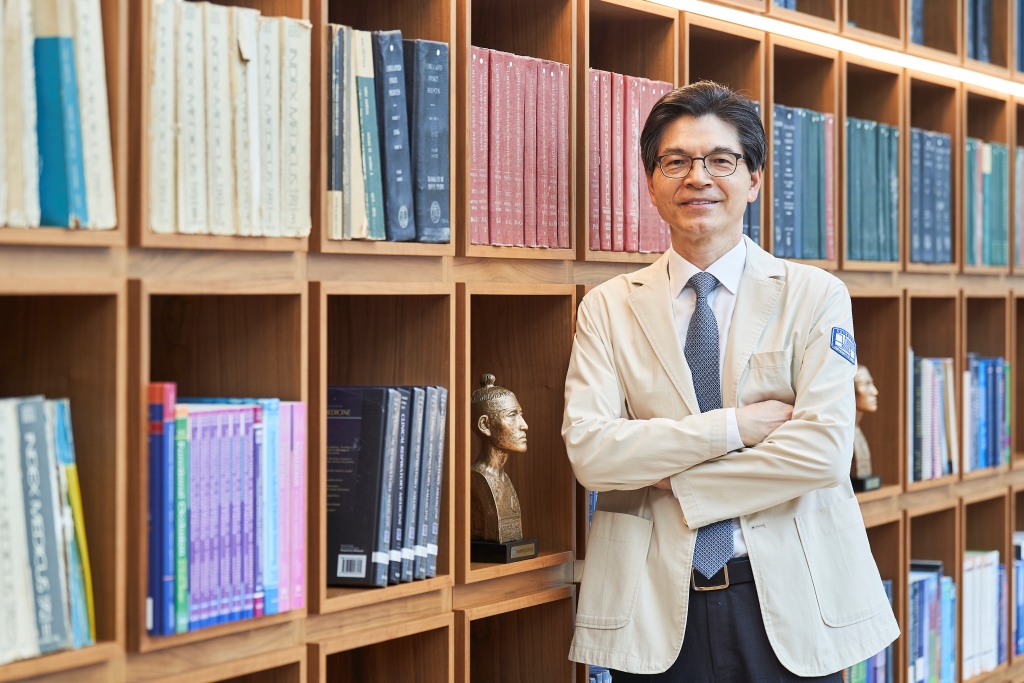-
Leading the future of basic medicine with multidisciplinary treatment and attentive listening / Professor Min Changki, SAuthor : 관리자Date : 2023.10.10Hit : 164
-
In recent medical practice, there has been a growing emphasis on internal and external collaboration to respond to various diseases and ensure effective treatment. Illustrating this trend, we asked Professor Min Changki, who is leading advanced medical practices through multi-institutional collaborative research with other hospitals based on outstanding research achievements in the field of hematopoietic stem cell transplantation and also serving as a professor of hematology, about the direction modern medicine should take.

Professor of Hematology, Min Changki
(Director of the Planning and Coordination Department at Catholic Medical Center/Head of the Basic Medical Science Project Promotion Team/Secretary-General of the Catholic Health Association of Korea)
Time Spent Saving Lives with Colleagues
I encountered a turning point in my life when I entered medical school, driven by my strong interest in biology during high school. As a medical resident, witnessing patients with blood cancers like leukemia, which were challenging to treat at the time, improve through chemotherapy and hematopoietic stem cell transplantation (HSCT) left a profound impression on me. It was this experience that steered me towards specializing in hematology.
The decision was far from easy, and in the early stages of my career, I often contemplated giving up. However, my wife's unwavering support and encouragement were instrumental. For 25 years, I have served as a professor at the Catholic University of Korea's medical school. While there have been numerous memorable moments over these years, the most rewarding one involved working with my colleagues to improve the clinical course of a blood cancer patient who was struggling with treatment. In the realm of research, I found similar fulfillment in completing papers based on joint research characterized by trust and smooth collaboration.
Setting Milestones in the Field of Blood Cancer
The Catholic Medical Center has linked its directly affiliated hospitals in Seoul into a network, establishing a tripartite belt for treating blood disorders. We are operating a highly specialized treatment system for blood disorders, integrating medical staff and beds. Personally, I have been consistently conducting both basic and clinical research in the field of hematopoietic stem cell transplantation (HSCT), which is crucial for treating blood cancer patients. In particular, my contributions to the research on graft versus host disease (GVHD), one of the complications of HSCT, were recognized, and in 2019, I received the inaugural Leading Researcher Award from the Korean Society for Hematopoietic Stem Cell Transplantation. Currently, I am focusing on the clinical and basic research of multiple myeloma in refractory blood cancer. After the clinical and basic research, I aim to design clinical research to establish optimal treatment protocols for multiple myeloma and develop cancer treatments that contribute to improved survival rates.
Our Blood Hospital has achieved many accomplishments in the research field. We are leading high-level research and development not only by performing standard treatments for general blood disorders but also by conducting high-complexity hematopoietic stem cell transplants, CAR-T therapy, global clinical research on targeted cancer drugs, and advanced regenerative medicine national projects. We have recently achieved the first 10,000 hematopoietic stem cell transplants in Korea. This milestone reached 40 years after the first successful allogeneic hematopoietic stem cell transplant in Korea at a time when there were no proper treatments for blood cancer, signifies the growth and development in this field. It represents the excellence and passion of our university's medical staff, making it all the more valuable.
Leader of Future Basic Medicine, CUK
I believe that the core of modern medical treatment lies in multidisciplinary care. While specialists in various fields perform nearly identical surgeries daily, diseases arise across multiple areas. It's essential to deepen specialized medical fields while also facilitating collaborative care across various disciplines. Only then can we manage the diverse diseases that affect humans and ensure patients maintain a quality life.
For six years since 2013, I served as the lead researcher for a multidisciplinary research project on rare blood diseases sponsored by the Ministry of Health and Welfare. During this time, I conducted collaborative research on intractable rare blood cancers, yielding significant results through cooperative efforts with professors from other institutions on rare diseases within Korea. It was a pivotal experience that made me realize the importance of multidisciplinary collaboration in both clinical and basic research, leading to the selection of our project as ""the 1st Sponsored Research and Development Project.""
Recently, with the Catholic University of Korea's decision to invest heavily in basic research, I have been appointed the Head of the Basic Medical Science Project Promotion Team at the Catholic Medical Center. Along with four other project leaders, we are initiating efforts to elevate the level of basic medical sciences at the Catholic University of Korea to the highest in the country. Focusing on advanced cell therapy, ultra-precision medicine, synthetic biology, and artificial intelligence in neuroscience, the College of Medicine at the Catholic University of Korea is set to lead the future of basic medical sciences.

Medical Professionals with Attentive Listening to Open Patients' Hearts
Alongside numerous research endeavors, the attitude toward patients is also crucial. Paradoxically, a patient's pain can often be significantly alleviated simply by a doctor's act of ""listening,"" yet the most common complaint in clinical settings is that doctors don't seem to listen to patients. Patients want to share more than their discomforting symptoms, but medical professionals often lack the time due to their busy schedules.
There's a work of Picasso that I always keep in mind. It's ""Science and Charity."" In this painting, the dying patient's hand, which touches the doctor on the left side, has turned black, signifying imminent death. However, the right hand appears full of life, as if blood circulation is still active. Why did Picasso paint this? It seems he wanted to express that while focusing on medical data and skills is important, treating patients with compassion is equally vital.
I hope that the students growing and nurturing their dreams of becoming medical professionals at our university will embrace not only level-headed rationality and extensive knowledge but also the virtues of warm empathy stemming from "listening."
-
Attachment File

